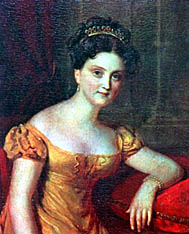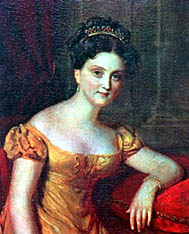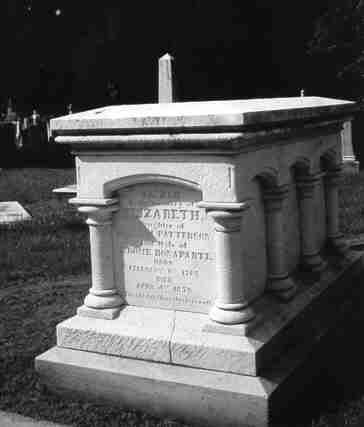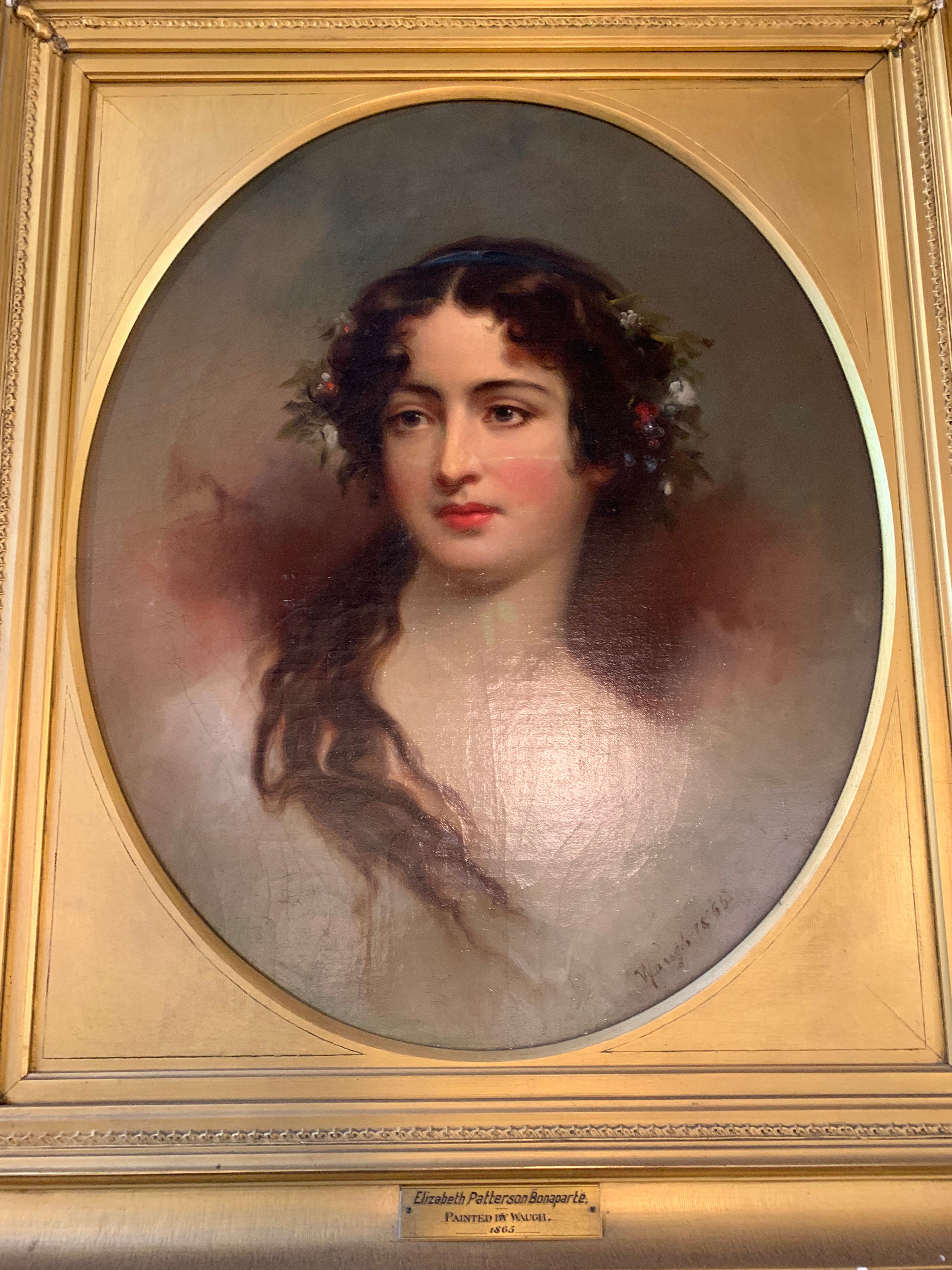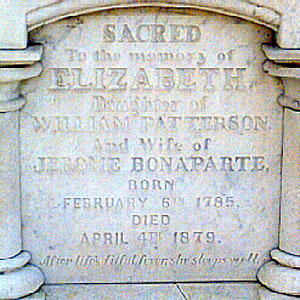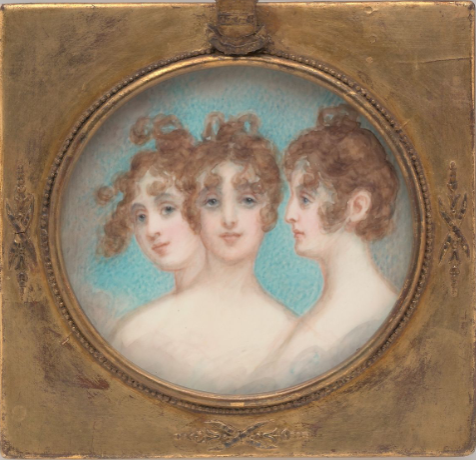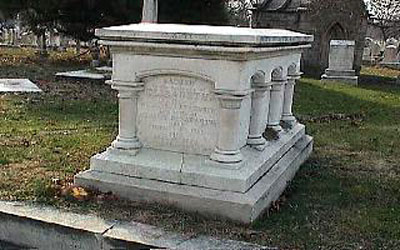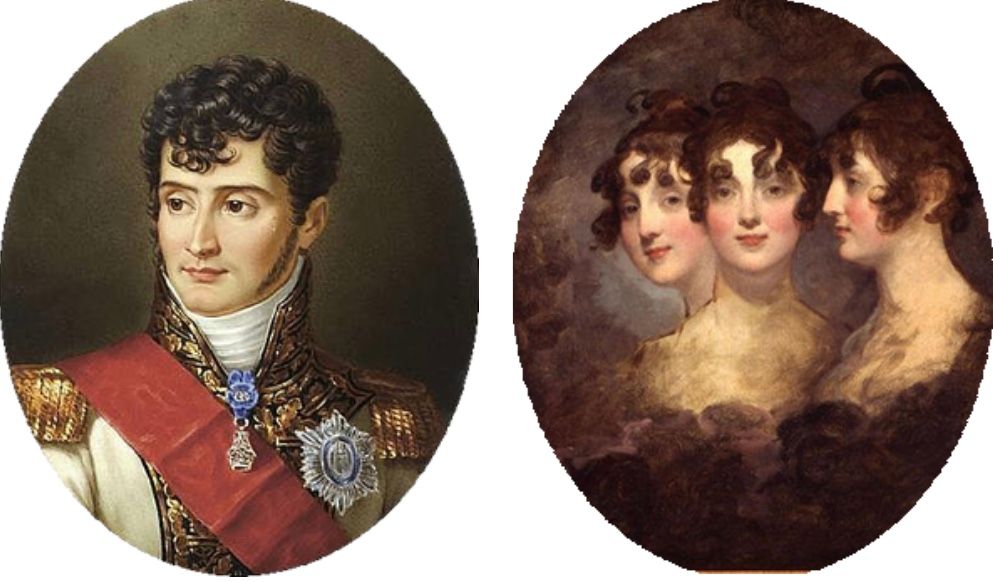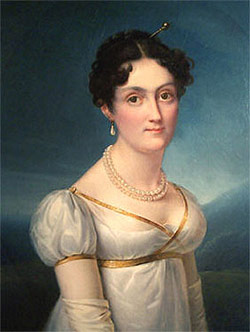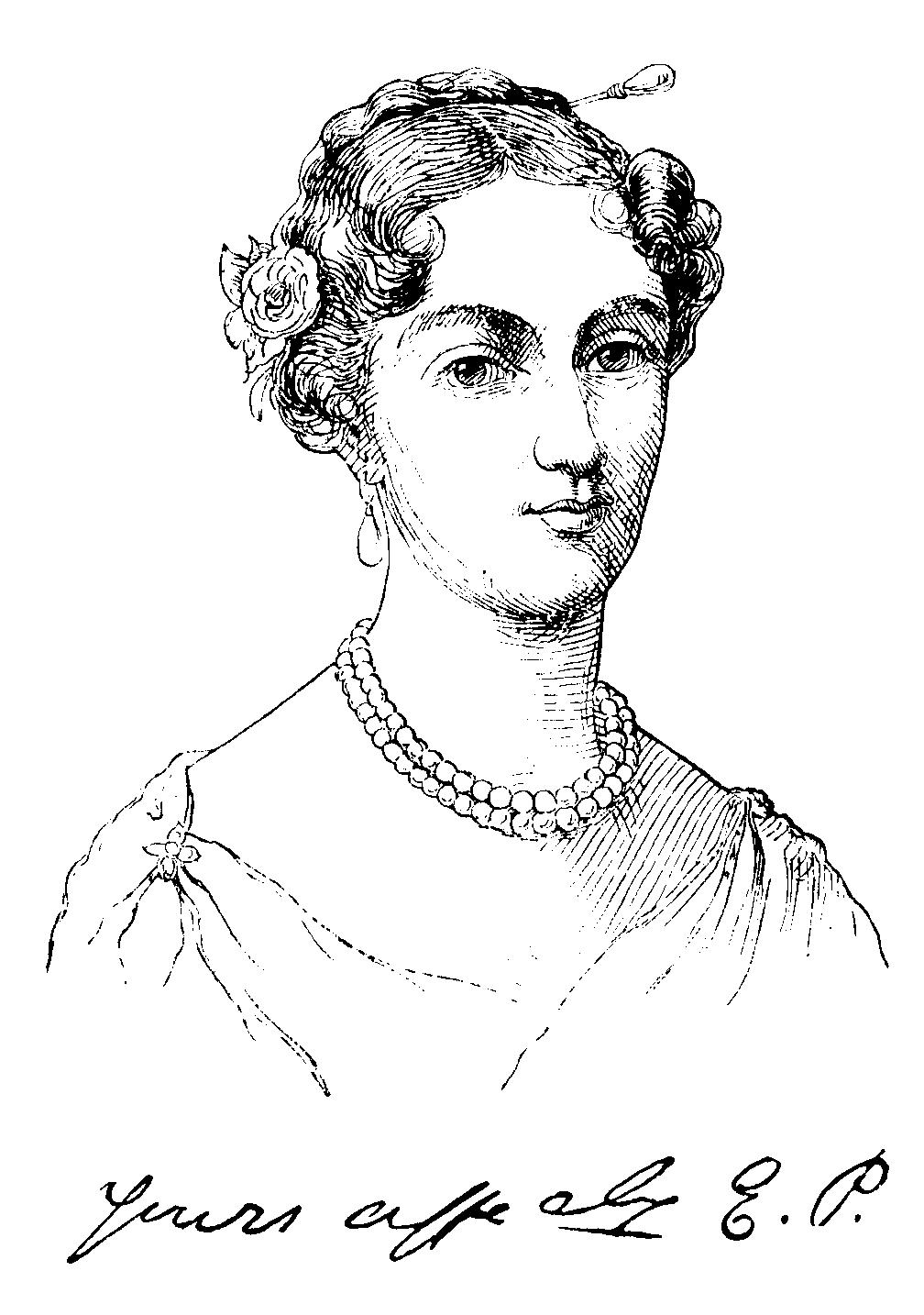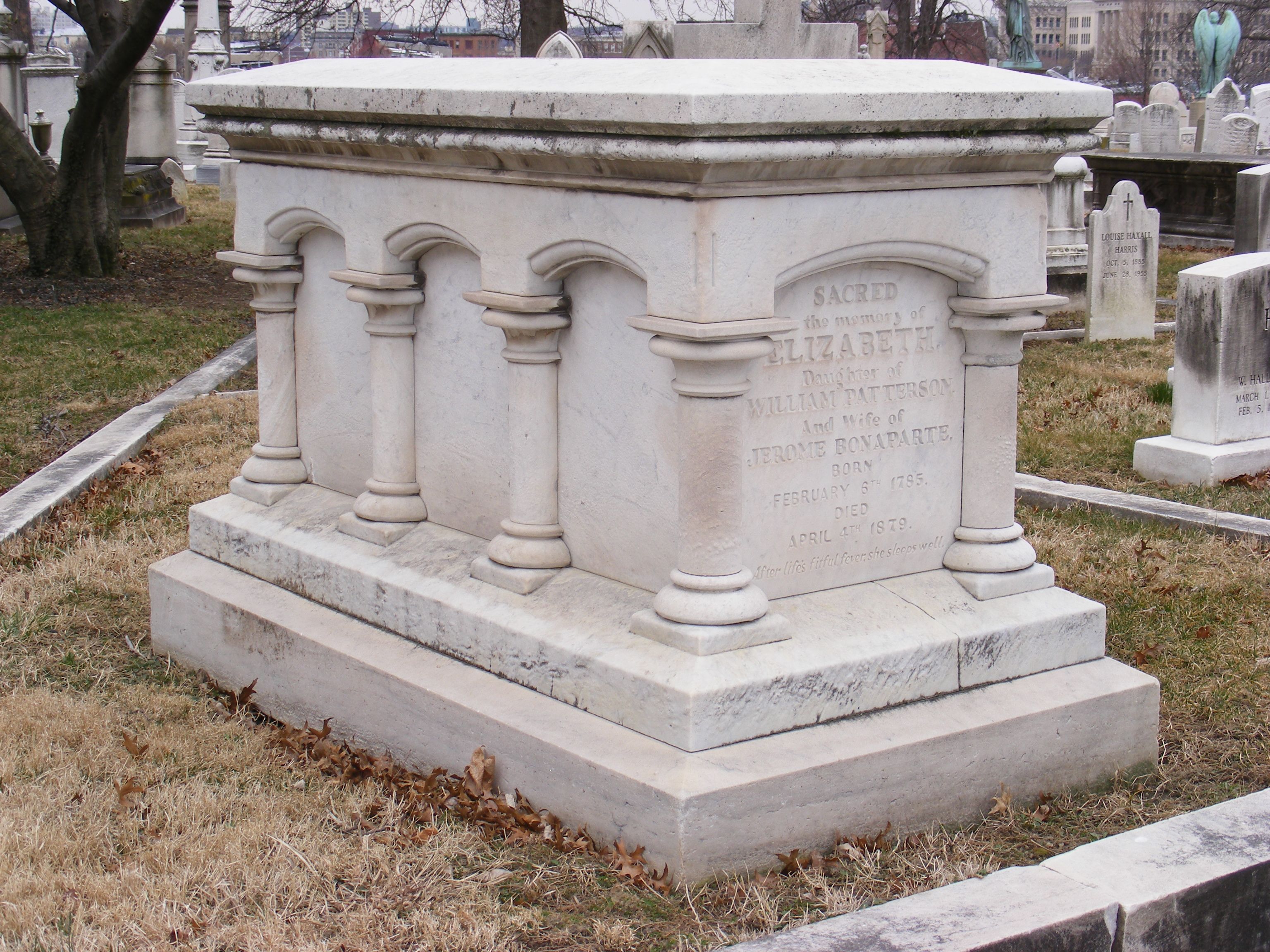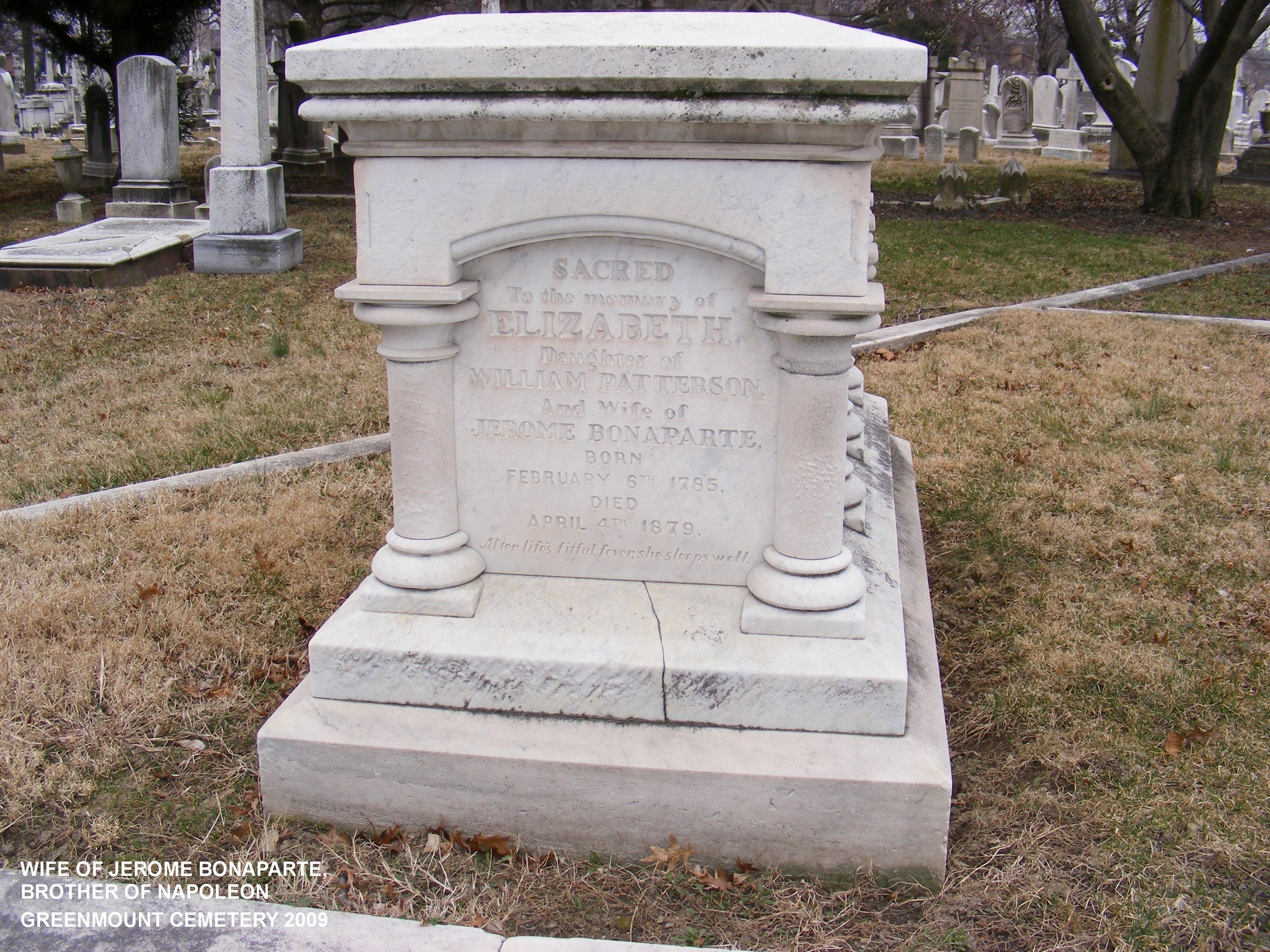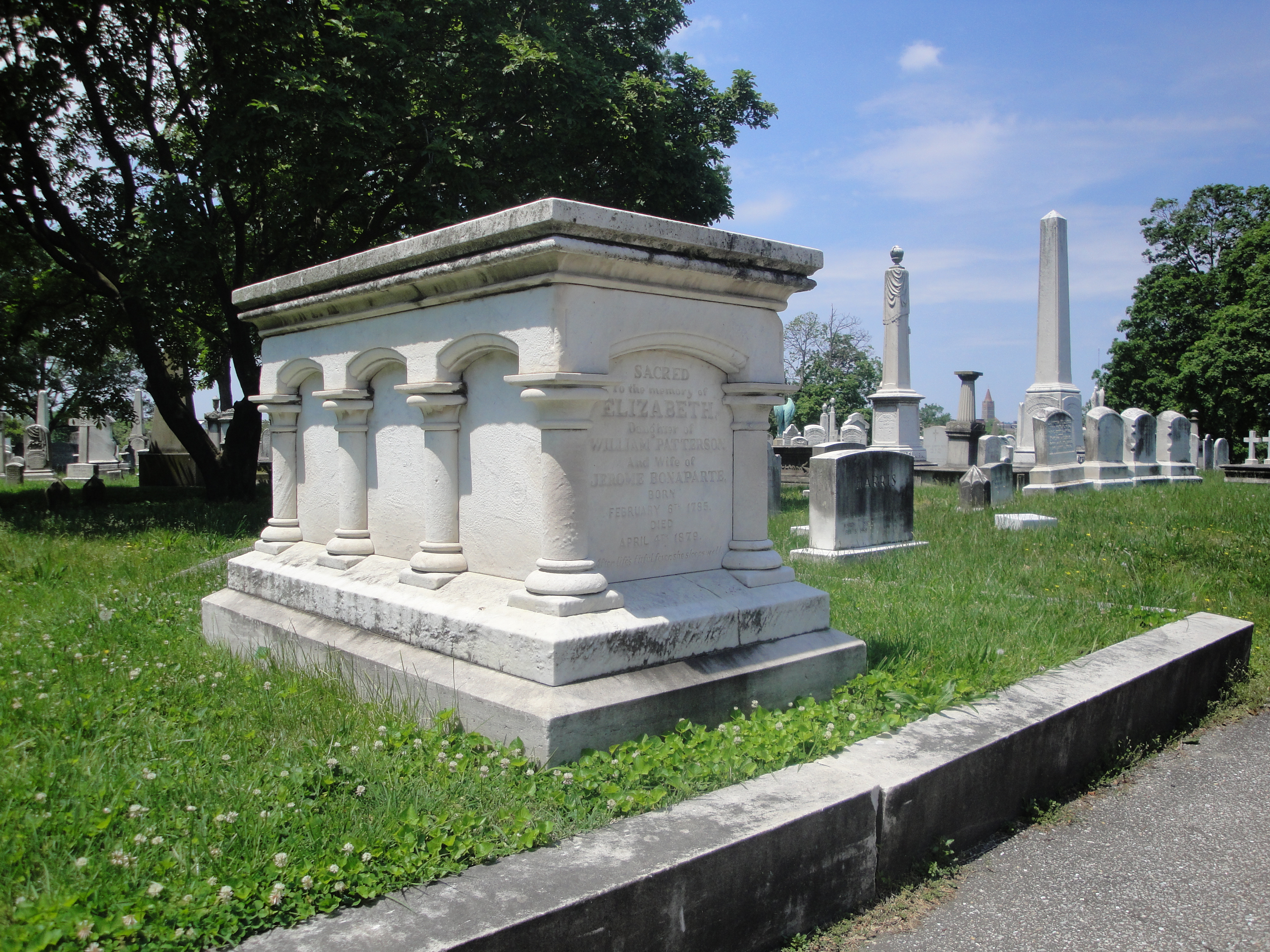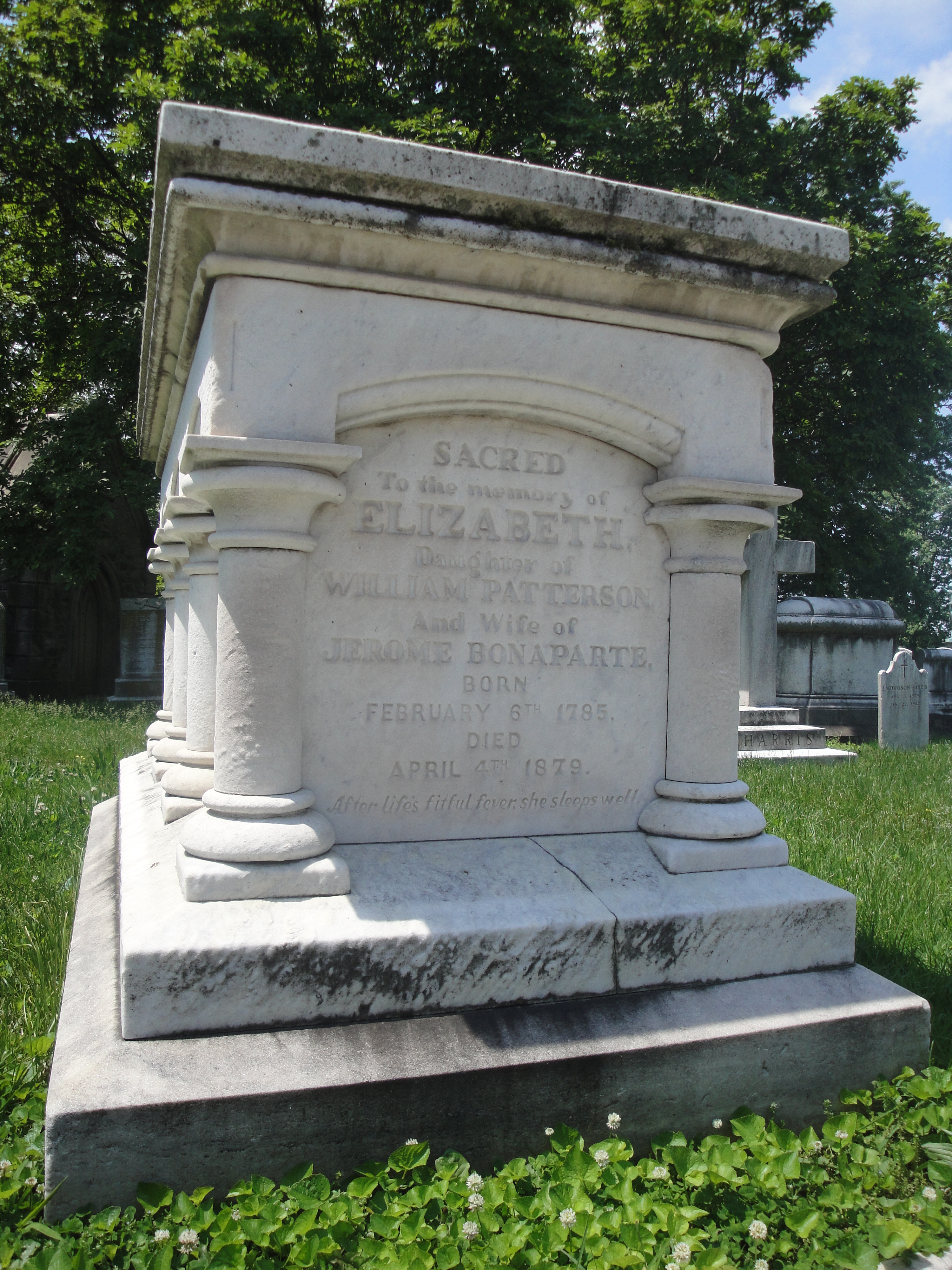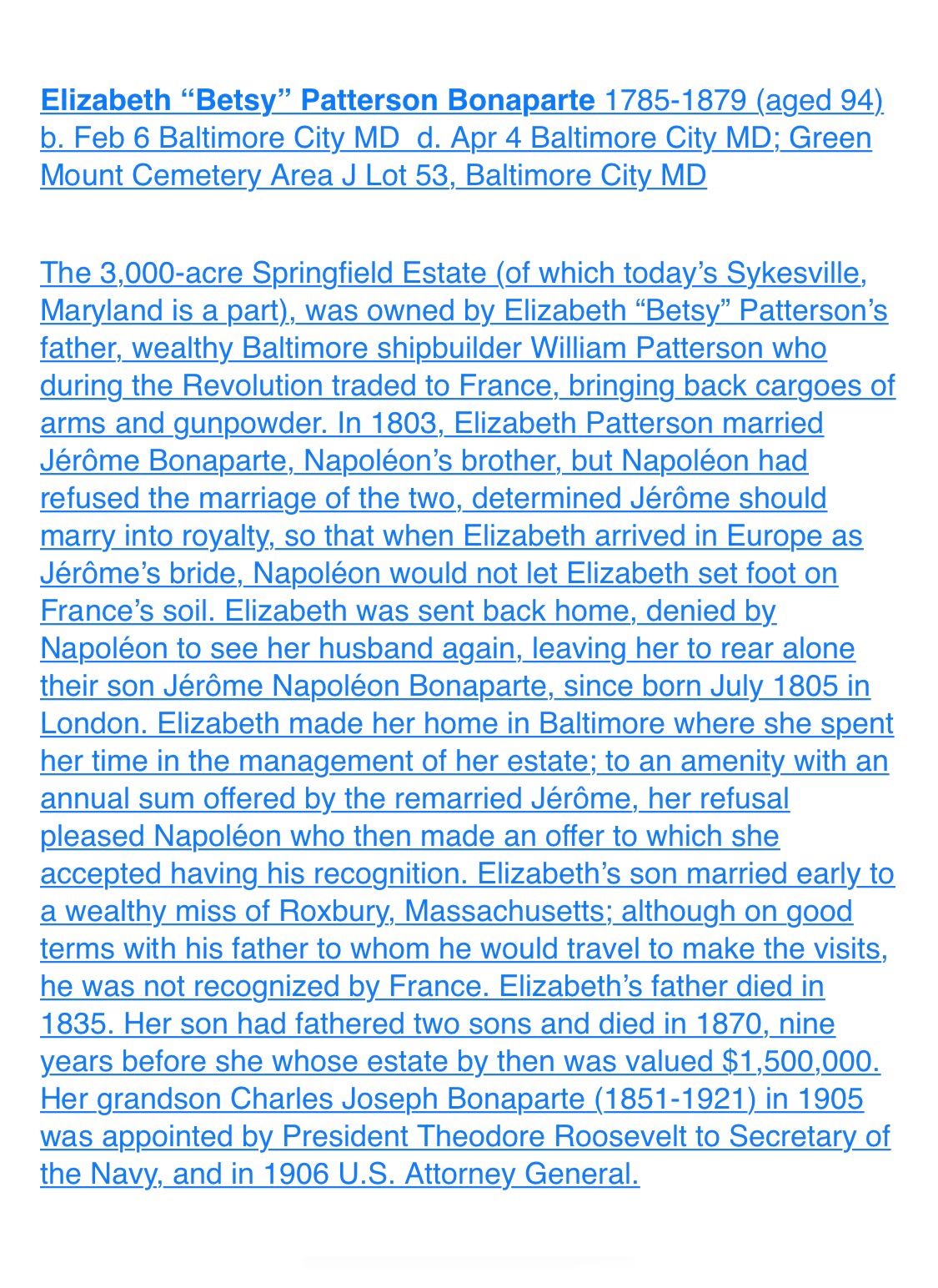Her father was the richest man in Baltimore. She married the French Navy officer Jerome Bonaparte on December 24, 1803. He was a brother of Napoleon, since 1799 First Consul of France. Napoleon immediately ordered him back to France and demanded him to have his marriage annulled. He preferred Jerome to marry a European princess. Jerome soon returned to France, accompanied by Elizabeth, who was now pregnant. But on orders of Napoleon, Elizabeth ('Betsy') was denied landing in any port on the European continent. In 1805 she gave in London birth to a son, Jerome Napoleon Bonaparte. Elizabeth's ex-husband, Jerome, adapted himself to the wishes of his brother, who had in the meantime crowned himself emperor of France. In 1807 Napoleon made him King of Westphalia and he married a princess of Wurtemburg. Betsy went with her son back to Baltimore, where she lived with her father. In 1815 her marriage was finally dissolved. After the battle of Waterloo she went to Europe, where she attracted much attention and was received in high society. Back in Baltimore she spent all her time in the management of her estate. Its value seems to have increased to $ 1,500,000. Her grandson Charles Joseph Bonaparte (1851-1921) was in 1905 appointed by President Theodore Roosevelt Secretary of the Navy and in 1906 U.S. Attorney General.
Source Woman of the Century/Elizabeth P. Bonaparte
BONAPARTE, Mme. Elizabeth Patterson, wife of Jerome Bonaparte, king of Westphalia, born in Baltimore, Md., 6th February, 1785, and died there 4th April, 1879. She was the daughter of William Patterson, the son of a farmer in county Donegal, Ireland. Her father came to the United States while he was a boy and settled in Baltimore. He went to Philadelphia, Pa., and was there employed in the counting-house of Samuel Johnson. He developed remarkable financial ability and soon became the owner of a line of clipper ships. During the Revolution he traded to France and brought back cargoes of arms and gunpowder. He acquired a large fortune and was the wealthiest man in .Maryland, with the exception of Charles Carroll, of Carrollton. Elizabeth Patterson was a young woman of remarkable beauty of person, of strong powers of intellect, and of great fascination of manners, when, in the autumn of 1803, at a ball in the house of Samuel Chase, in Baltimore, she met Jerome Bonaparte, then in command of a French frigate. As the brother of Napoleon I, he was hospitably received. On their first meeting Captain Bonaparte and Miss Patterson fell in love. Marriage was proposed, but her father, foreseeing the grave difficulties implied in such an alliance with the brother of the First Consul, forbade the lovers to meet. Miss Patterson was sent to Virginia. The lovers corresponded, and Jerome procured a marriage license. The wedding was postponed until 24th December, 1803, when Jerome should have passed his nineteenth birthday. On that date the marriage ceremony was performed by Archbishop Carroll. All the legal formalities had been carefully provided for. The contract was drawn by Alexander Dallas, and the wedding was attended by the mayor of Baltimore, the vice-con- sul of France and many distinguished persons. Napoleon I obstinately opposed the match from first to last. He notified Jerome that, if he would leave "the young person" in the United States and return to France, his "indiscretion" would be forgiven, and that, if he took her with him to France, she should not be permitted to set foot on French territory. He actually gave orders that neither Jerome nor his wife should be permitted to land at any port controlled by France. In spite of that order, Jerome and his wife sailed in 1805, on one of Mr. Patterson's ships, for Europe. The ship was wrecked between Philadelphia and the Capes. Embarking on another vessel, they sailed for Lisbon. There the wife remained, while Captain Bonaparte went on to Paris, hoping to make peace with his brother. Napoleon I was obstinate and absolutely refused to recognize the marriage. Madame Bonaparte sailed from Lisbon for Amsterdam, but at the mouth of the Texel two French men-of-war met her, and refused to allow her to land. She then sailed for England. So great a throng of persons gathered to see her land at Dover, that Pitt sent a regiment to that port to preserve order. She went at once to Camberwell, where her only child, Jerome Napoleon Bonaparte, was born 7th July, 1805. Her husbaiid continued to send her messages of love and fidelity. Napoleon asked Pope Pius VII to dissolve the marriage, but the pontiff refused to do so. The Imperial Council of State, at Napoleon's order, passed a decree of divorce. In September, 1805, Madame Bonaparte returned to the United States. Her family gave her an ungracious reception. Her father refused to pay the stipulated income, because Napoleon had annulled the union. Jerome soon afterward was married to Princess Frederica, of Würtemburg. He offered his discarded wife the principality of Smalcand, with an annual income of 140,000. Her reply was: "Westphalia, no doubt, is a considerable kingdom, but not large enough to hold two queens." The reply pleased Napoleon, who directed the French Minister in Washington to intimate his desire to serve her. She replied: "Tell the Emperor I am ambitious; I wish to be made a duchess of France." The Emperor promised to confer that rank upon her, and offered immediately a gross sum of $20,000, with a life annuity of $12,000. That she accepted, "proud to be indebted to the greatest man of modern times." She stipulated that the receipts for payment should be signed by her as "Elizabeth Bonaparte." To that the Emperor acceded, and until his dethronement the annuity was regularly paid. Her husband was angry because she refused aid from him and accepted it from his brother, but she retorted that she " preferred shelter beneath the wing of an eagle to suspension from the pinion of a goose." The submission of Jerome to the commands of his brother was rewarded. He received a high command in the Navy of France and showed himself a competent officer. In 1806 he was made a brigadier-general in the army, and in 1807 was created King of Westphalia. Mme. Bonaparte applied to the Maryland Legislature for a divorce, which was granted without difficulty. Her motive for taking this step is not easily comprehended. The Pope had refused to annul a marriage which had received the open sanction of the Church. The social position of Mme. Bonaparte had never been in the least compromised by her domestic misfortunes. After the fall of Napoleon Madame Bonaparte visited France, where she was honorably received. Only once after the separation did she ever see Jerome. In the gallery of the Pitti Palace, in Florence, they met. She simply said; "It is Jerome." He whispered to his wife: "That lady is my former wife." Madame Bonaparte was well received in Florence and in Rome. Returning to the United States, she mad- her home in Baltimore. She lived economically and amassed a fortune. Her son, Jerome Bonaparte, was graduated from Harvard College in 1826. He studied law, but never practiced. He was married in early life to Susan Mary Williams, a wealthy lady of Roxbury, Mass. He visited France and was on intimate terms with his father. He was never naturalized, and always called himself a citizen of France, although the French courts never recognized his legitimacy He died in Baltimore 17th June, 1870. His two sons, Jerome Napoleon and Charles Joseph, survived him. Madame Bonaparte's later years were passed in quiet. Her proud spirit, her ambitious temper and her misfortunes alienated her from her father and her son, and her wit took a biting turn with old age. She put forward the claims of her grandson to the throne of France, but without hope of success. She left an estate valued at $1,500,000.
Her father was the richest man in Baltimore. She married the French Navy officer Jerome Bonaparte on December 24, 1803. He was a brother of Napoleon, since 1799 First Consul of France. Napoleon immediately ordered him back to France and demanded him to have his marriage annulled. He preferred Jerome to marry a European princess. Jerome soon returned to France, accompanied by Elizabeth, who was now pregnant. But on orders of Napoleon, Elizabeth ('Betsy') was denied landing in any port on the European continent. In 1805 she gave in London birth to a son, Jerome Napoleon Bonaparte. Elizabeth's ex-husband, Jerome, adapted himself to the wishes of his brother, who had in the meantime crowned himself emperor of France. In 1807 Napoleon made him King of Westphalia and he married a princess of Wurtemburg. Betsy went with her son back to Baltimore, where she lived with her father. In 1815 her marriage was finally dissolved. After the battle of Waterloo she went to Europe, where she attracted much attention and was received in high society. Back in Baltimore she spent all her time in the management of her estate. Its value seems to have increased to $ 1,500,000. Her grandson Charles Joseph Bonaparte (1851-1921) was in 1905 appointed by President Theodore Roosevelt Secretary of the Navy and in 1906 U.S. Attorney General.
Source Woman of the Century/Elizabeth P. Bonaparte
BONAPARTE, Mme. Elizabeth Patterson, wife of Jerome Bonaparte, king of Westphalia, born in Baltimore, Md., 6th February, 1785, and died there 4th April, 1879. She was the daughter of William Patterson, the son of a farmer in county Donegal, Ireland. Her father came to the United States while he was a boy and settled in Baltimore. He went to Philadelphia, Pa., and was there employed in the counting-house of Samuel Johnson. He developed remarkable financial ability and soon became the owner of a line of clipper ships. During the Revolution he traded to France and brought back cargoes of arms and gunpowder. He acquired a large fortune and was the wealthiest man in .Maryland, with the exception of Charles Carroll, of Carrollton. Elizabeth Patterson was a young woman of remarkable beauty of person, of strong powers of intellect, and of great fascination of manners, when, in the autumn of 1803, at a ball in the house of Samuel Chase, in Baltimore, she met Jerome Bonaparte, then in command of a French frigate. As the brother of Napoleon I, he was hospitably received. On their first meeting Captain Bonaparte and Miss Patterson fell in love. Marriage was proposed, but her father, foreseeing the grave difficulties implied in such an alliance with the brother of the First Consul, forbade the lovers to meet. Miss Patterson was sent to Virginia. The lovers corresponded, and Jerome procured a marriage license. The wedding was postponed until 24th December, 1803, when Jerome should have passed his nineteenth birthday. On that date the marriage ceremony was performed by Archbishop Carroll. All the legal formalities had been carefully provided for. The contract was drawn by Alexander Dallas, and the wedding was attended by the mayor of Baltimore, the vice-con- sul of France and many distinguished persons. Napoleon I obstinately opposed the match from first to last. He notified Jerome that, if he would leave "the young person" in the United States and return to France, his "indiscretion" would be forgiven, and that, if he took her with him to France, she should not be permitted to set foot on French territory. He actually gave orders that neither Jerome nor his wife should be permitted to land at any port controlled by France. In spite of that order, Jerome and his wife sailed in 1805, on one of Mr. Patterson's ships, for Europe. The ship was wrecked between Philadelphia and the Capes. Embarking on another vessel, they sailed for Lisbon. There the wife remained, while Captain Bonaparte went on to Paris, hoping to make peace with his brother. Napoleon I was obstinate and absolutely refused to recognize the marriage. Madame Bonaparte sailed from Lisbon for Amsterdam, but at the mouth of the Texel two French men-of-war met her, and refused to allow her to land. She then sailed for England. So great a throng of persons gathered to see her land at Dover, that Pitt sent a regiment to that port to preserve order. She went at once to Camberwell, where her only child, Jerome Napoleon Bonaparte, was born 7th July, 1805. Her husbaiid continued to send her messages of love and fidelity. Napoleon asked Pope Pius VII to dissolve the marriage, but the pontiff refused to do so. The Imperial Council of State, at Napoleon's order, passed a decree of divorce. In September, 1805, Madame Bonaparte returned to the United States. Her family gave her an ungracious reception. Her father refused to pay the stipulated income, because Napoleon had annulled the union. Jerome soon afterward was married to Princess Frederica, of Würtemburg. He offered his discarded wife the principality of Smalcand, with an annual income of 140,000. Her reply was: "Westphalia, no doubt, is a considerable kingdom, but not large enough to hold two queens." The reply pleased Napoleon, who directed the French Minister in Washington to intimate his desire to serve her. She replied: "Tell the Emperor I am ambitious; I wish to be made a duchess of France." The Emperor promised to confer that rank upon her, and offered immediately a gross sum of $20,000, with a life annuity of $12,000. That she accepted, "proud to be indebted to the greatest man of modern times." She stipulated that the receipts for payment should be signed by her as "Elizabeth Bonaparte." To that the Emperor acceded, and until his dethronement the annuity was regularly paid. Her husband was angry because she refused aid from him and accepted it from his brother, but she retorted that she " preferred shelter beneath the wing of an eagle to suspension from the pinion of a goose." The submission of Jerome to the commands of his brother was rewarded. He received a high command in the Navy of France and showed himself a competent officer. In 1806 he was made a brigadier-general in the army, and in 1807 was created King of Westphalia. Mme. Bonaparte applied to the Maryland Legislature for a divorce, which was granted without difficulty. Her motive for taking this step is not easily comprehended. The Pope had refused to annul a marriage which had received the open sanction of the Church. The social position of Mme. Bonaparte had never been in the least compromised by her domestic misfortunes. After the fall of Napoleon Madame Bonaparte visited France, where she was honorably received. Only once after the separation did she ever see Jerome. In the gallery of the Pitti Palace, in Florence, they met. She simply said; "It is Jerome." He whispered to his wife: "That lady is my former wife." Madame Bonaparte was well received in Florence and in Rome. Returning to the United States, she mad- her home in Baltimore. She lived economically and amassed a fortune. Her son, Jerome Bonaparte, was graduated from Harvard College in 1826. He studied law, but never practiced. He was married in early life to Susan Mary Williams, a wealthy lady of Roxbury, Mass. He visited France and was on intimate terms with his father. He was never naturalized, and always called himself a citizen of France, although the French courts never recognized his legitimacy He died in Baltimore 17th June, 1870. His two sons, Jerome Napoleon and Charles Joseph, survived him. Madame Bonaparte's later years were passed in quiet. Her proud spirit, her ambitious temper and her misfortunes alienated her from her father and her son, and her wit took a biting turn with old age. She put forward the claims of her grandson to the throne of France, but without hope of success. She left an estate valued at $1,500,000.
Bio by: FS
Inscription
Sacred to the memory of
Daughter of William Patterson
And wife of Jerome Bonapart
After life's fitful fever, she sleeps well.
Family Members
-
![]()
William Patterson Jr
1780–1808
-
![]()
Robert Patterson
1781–1822
-
![]()
John Patterson
1783–1851
-
![]()
Lieut Joseph Wilson Patterson
1786–1866
-
![]()
Edward Patterson
1789–1865
-
![]()
Augusta Sophia Patterson
1791–1793
-
![]()
Margaretta "Margaret" Patterson
1793–1811
-
![]()
George Patterson Sr
1796–1869
-
![]()
Caroline Patterson
1798–1814
-
![]()
Henry Patterson
1800–1858
-
![]()
Octavus Patterson
1802–1814
-
![]()
Mary Ann Jeromia Patterson
1804–1807
